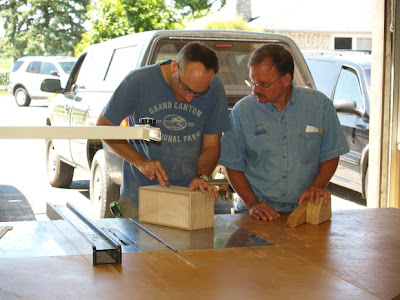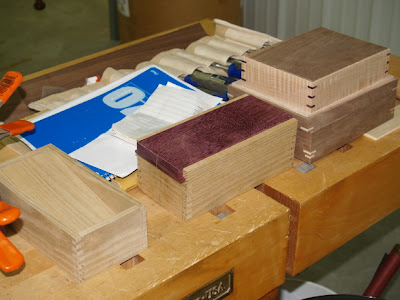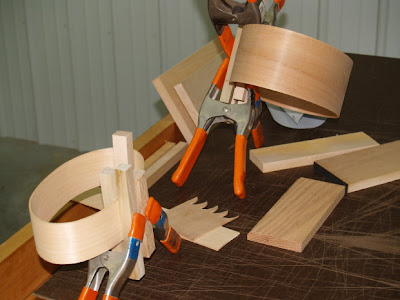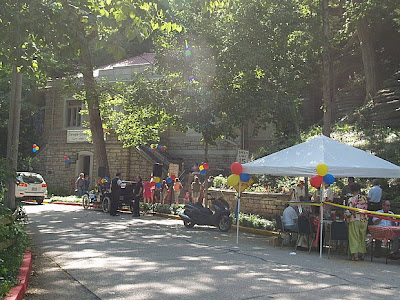As I prepare to leave the Furniture Society Conference, I note that there are many young people on campus today. High School students are here for an event called
"Eurekafest" and there are signs all over on lamp posts proclaiming "Eureka". Coming from Eureka Springs, Arkansas, I could not help but feel their welcome.
I want to talk just for a minute about the relationship between science and the crafts... a subject I have pursued before in the blog, but that comes to mind again, inspired by meeting Alex Slocum whom I mentioned in an earlier post, and being on the MIT campus surrounded by high tech kids.
One new friend at the conference told me that as a biologist turned woodworker/furniture designer he sees the hands and their use as a biological imperative. Perhaps a psychologist would see them as a necessary psychic compulsion. If my friend were an electrical engineer, he would probably have used the term, "hard wired." From a more general perspective, more metaphorical, I see the hands as "touching" every facet of human existence, from the way we think, to the ways we talk, to the ways we understand the universe and each other. And as each of us becomes more watchful and cognizant of the role our hand play in our lives, we may each become more astounded.
But what the heck are we touching, and what are we using the hands to explore? Shall we launch their explorations toward the fundamental biological, physical and cultural landscape, or narrow their exploration to the serial iterations of consumer devices that are designed to monopolize their attentions with illusions of creativity? It is a question we need to ask. For thousands of generations, human scientific understanding was based on observations that took place in our physical manipulations of material through the making of beautiful and useful objects. Thus it can be stated without reservation, that the hands provided the foundation of human life and understanding. In honor of the human inventive and creative spirit, make, fix, repair, care, create in physical form, plant, sew, nurture and tend.
Heureka! It is the process of learning as discovery, and what we are celebrating this week at MIT, which was a foundation site for the digital revolution. Much earlier, it was a foundation site for the launch of the manual arts in America. Anyone know how to punch rewind?
One of the things I wanted to make clear to yesterday's audience was the role of the knife in the practice of educational sloyd. First, you cannot cut wood successfully with a knife without becoming attentive to the properties of wood. Thus we encounter the foundation of scientific exploration of material properties. Secondly, because a knife is used to cut curves, it invites intellectual engagement in the process of design. A line, using the terminology of a boat builder, is either fair or not, which is often a thing that is more easily perceived and understood by the hand than by the eye.
If you achieve greater intellectual engagement with your own hands, you may gain an insight into what we are ignoring in the education of our kids. Use whichever terminology is most comfortable for you. State it as a biological imperative, or a psychological compulsion. Regard the hands as hard-wired to the brain. They make you smart, and perhaps even more so if you take the time to notice, and nurture their effect.
 We finished day 3 of box making and you can see progress in the photos above and below. Today I demonstrated how to cut hinge mortises, how to install tabs for opening, how to make a box joint jig and box joints using the table saw. There is a great deal of learning going on. We make mistakes and we learn. We are successful and we learn from that, too. Most of my students are working on a variety of box designs using a variety of woods. Tomorrow I will teach one more joinery technique and begin instruction in making inlay. No doubt there will be other things, too. I am grateful for the excellent staff at Marc Adams School.
We finished day 3 of box making and you can see progress in the photos above and below. Today I demonstrated how to cut hinge mortises, how to install tabs for opening, how to make a box joint jig and box joints using the table saw. There is a great deal of learning going on. We make mistakes and we learn. We are successful and we learn from that, too. Most of my students are working on a variety of box designs using a variety of woods. Tomorrow I will teach one more joinery technique and begin instruction in making inlay. No doubt there will be other things, too. I am grateful for the excellent staff at Marc Adams School. 









.jpeg)






































